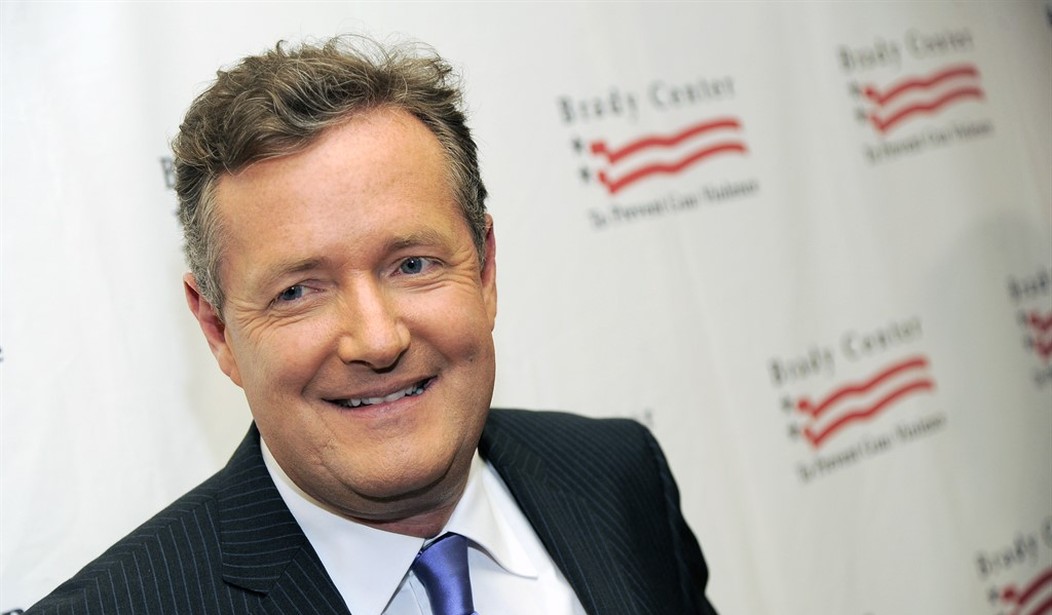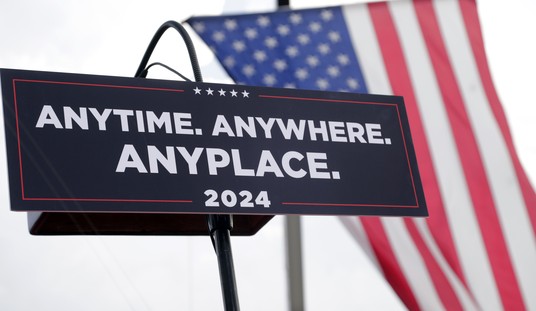The man’s a tool but I admire his immodesty in taking on all comers in a debate on a subject about which he’s obviously ignorant. He’s the guy at the bar who’s too drunk to stand up but proclaims himself ready to kick the ass of every man within earshot. You may think him sad and annoyingly belligerent. But he’s got moxie.
We should not change the First Amendment to ban Nazis, by the way.
Both 1st & 2nd Amendments should be amended again, in my humble opinion.
To ban Nazis & reduce gun deaths. https://t.co/6kfGsx98Bi— Piers Morgan (@piersmorgan) August 16, 2017
What these Nazis did in Charlottesville is not free speech. If America doesn't wake up to this fact fast, it is in deep trouble. https://t.co/S7vkgOw0mh
— Piers Morgan (@piersmorgan) August 16, 2017
Pretty much everything the Nazis did in Charlottesville was free speech, up until James Fields got behind the wheel and fights started breaking out with counter-protesters. You can in fact chant “blood and soil” in a crowded theater in America, to borrow a phrase. (Although you’ll annoy the theatergoers around you.) Piers has it all figured out, though:
US Constitution bans shouting 'fire!' in a theater, but allows armed Nazis to spew hateful, violent, racist, anti-Semitic rhetoric.
Absurd.— Piers Morgan (@piersmorgan) August 16, 2017
Acquaint yourself with Schenck v. United States, 1919.
Explaining US law to Americans is what's tiring. https://t.co/fOmBaEBVUU— Piers Morgan (@piersmorgan) August 16, 2017
Lawyers who read that had a laugh, as did lots of people who didn’t go to law school but are sufficiently interested in the history of free speech in America to have cracked a book on it once. Schenck is a notorious case from World War I in which an anti-war protester handing out leaflets urging people to dodge the draft got locked up for violating the Espionage Act(!). He sued on First Amendment grounds — and lost, with the Supreme Court ruling that dangerous speech could of course be banned by the government. That’s where the infamous formulation about not (falsely) shouting “fire” in a crowded theater came from, courtesy of Oliver Wendell Holmes.
Soon after Schenck, though, Holmes and the Court started to have a rethink about the implications of banning dangerous speech and where that might lead. Fifty years later, in Brandenburg v. Ohio, the Court announced a new standard for criminal “incitement” — drawn very narrowly, to protect as much speech as possible. (Under Brandenburg, which I mentioned here, virtually anything short of goading an angry mob to attack is protected.) In citing Schenck, Morgan’s relying on a case that the Supreme Court started inching away from nearly 100 years ago and which it abandoned nearly 50 years ago. He’s opening the door to reintroducing sedition prosecutions, citing a precedent that was used to jail a peaceful socialist war critic. That’s some fancy thinkin’ for a liberal.
When people started calling him out for this on Twitter, he fired back that he knows his incitement law quite well, thank you. Spoiler: He does not know his incitement law well.
It remains unlawful to incite a violent reaction with false claims. I know my US law, rather better than you it would seem. https://t.co/z6PhvRUIgx
— Piers Morgan (@piersmorgan) August 16, 2017
Truth or falsity has nothing to do with incitement, a point that should be obvious if you reflect on it for two seconds. If an anti-semitic mob has a Jewish man cornered and someone yells “Kill the Jew!”, it’s, errrrr, not a defense to point out that the victim was in fact Jewish. Falsity is an element in defamation, another exception to the First Amendment but not one that has anything to do with incitement. There are three elements to unlawful incitement under Brandenburg — intent to cause lawbreaking with your words, likelihood that people listening to you will in fact break the law, and imminence between the two. The last factor is important as it explains why so much Nazi speech is protected by the First Amendment. A Nazi might say “Kill the Jews!”; he might mean every word; and his audience of fellow Nazis might be ramped up to make it happen. But unless he’s saying it in a situation where it seems like that audience might act imminently, it’s protected speech. That’s why Nazi or Islamist propaganda online isn’t against the law. Even if the reader is inspired by it to behave violently, his lawless action isn’t imminent at the time. Those are the variables you should be focused on if you’re analyzing incitement, not “false claims.”
When Ben Shapiro, who went to Harvard Law, interjected to inform Morgan that he doesn’t know what he’s talking about, Piers (a) goofed on his height and (b) declared that American law schools suck. So … maybe he’s just trolling with all of this? Or maybe the thing about “false claims” was the germ of a tortured argument in which defamation committed by Nazis should be considered the “lawless action” that makes them indictable for incitement under Brandenburg? I don’t know. I think maybe he was just bored and farting around on Twitter. As one does.








Join the conversation as a VIP Member